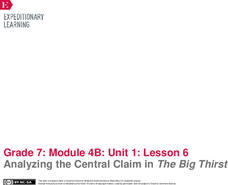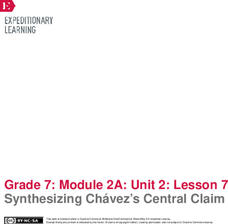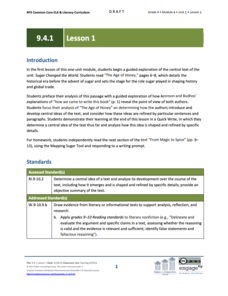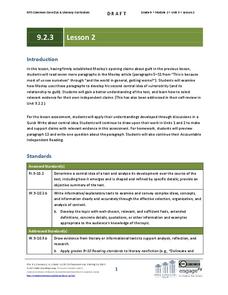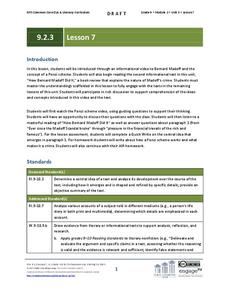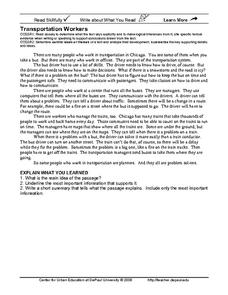EngageNY
Analyzing the Central Claim in The Big Thirst
Quench the class's thirst for knowledge while building analytical skills. Scholars listen as the teacher reads excerpt from the book The Big Thirst. They then complete a close read and answer text-dependent questions from pages one...
EngageNY
Analyzing the Central Claim and Supporting Claims: “The Shakespeare Shakedown”
Scholars continue to analyze Simon Schama's article "The Shakespeare Shakedown." They participate in a jigsaw discussion to identify the author's argument and supporting claims. Pupils also write objective summaries of the text.
EngageNY
Synthesizing Chávez’s Central Claim
Class members play an interactive game, matching strips of paper containing rhetorical devices with examples from César Chávez use rhetoric in his 1984 speech, "Address to the Commonwealth Club of California." Next, partners discuss...
EngageNY
Identifying Main Ideas and Supporting Details: What’s Going On in the Teenage Brain?
What's going on in the teen brain? Pupils consider the question as they continue reading an informational article about the topic. While reading, they use a Thinking Log worksheet and an anchor chart to track their understanding of...
DePaul University
Learn about Fables
Expose young readers to a new genre of fiction with a short reading passage. After learning about fables, children identify the main idea and supporting details in preparation for writing a short summary. Read the text as a class,...
Curated OER
Reading Comprehension 2: Level 8
Need a quick assessment of your middle schoolers' reading comprehension skills? The four questions on this quiz ask readers to identify the likely source of the article, define words based on context, and identify the main idea of the...
DePaul University
A Garden in Lawndale
We are all capable of changing the world for the better; all it takes is a spark. Read about a group of seventh grade students in Chicago, IL who took it upon themselves to improve their community by turning a vacant lot into a garden....
DePaul University
The Football Team
Playing team sports is about more than just scoring the most goals or winning the most games. Read this passage with your class and learn how athletes build character as members of a team. When finished, individuals identify the main...
DePaul University
Working at the Television Station
There's a lot that goes on behind the scenes of a local news program. Read this passage independently or as a whole class to learn about all the different people that work hard to bring us the news. Afterward, young learners determine...
EngageNY
Grade 9 ELA Module 4, Unit 1, Lesson 1
How do writers introduce and develop the central ideas in a text? To answer this question, ninth graders closely examine "The Age of Honey," the opening chapter in Marc Aronson and Marina Budhos' Sugar Changed the World: A Story of...
EngageNY
Grade 9 ELA Module 2, Unit 3, Lesson 2
"Everybody is guilty of something." As class members continue their close reading of Walter Mosley's essay, they examine how Mosley develops and supports his central ideas about Western civilization's relationship to guilt.
Polk Bros Foundation
How to Summarize an Event in History or Today - or a Story
Ask your class to write a quick summary of a historical or current event. The worksheet offers a place to note down important details about the event, such as time, place, people, how it started, and how it ended. Pupils then take this...
EngageNY
Grade 9 ELA Module 2, Unit 3, Lesson 7
After viewing an informational video that introduces Bernard Madoff and the concept of a Ponzi scheme, class members begin reading "How Bernard Madoff Did It," Liaquat Ahamed's New York Times book review that explains Madoff's crime, and...
Curated OER
Transportation Workers
Summarizing a text means being able to identify supporting details. Your class can learn about transportation workers in Chicago as they read a one-page informational passage. When they are finished reading they'll explain what they've...
Curated OER
Researching the Past
Learners research the western movement in order to learn note taking strategies with nonfiction texts. They use the Internet to search for important information about the western movement using the Cornell Notes note-taking system. They...
Curated OER
Identifying Text Structure
Work on identifying text structure with this thorough worksheet. After studying a diagram depicting six different text structures (compare/contrast, spatial, chronological, problem and solution, cause and effect, and order of...
EngageNY
End of Unit Assessment: Analyzing the Structure of Chávez’s Wrath of Grapes Speech
César Chávez gave his 1986 "Wrath of Grapes" speech to educate consumers about pesticide use. Scholars complete an end of unit 2 assessment, applying what they learned throughout the unit to a new text. They then analyze the structure of...
EngageNY
Building Background Knowledge: Guided Practice to Learn about the History of Wars in Vietnam
Scholars use a map of Asia to help them better understand the article "The Vietnam Wars," focusing on word meaning in the title and subtitle. Learners then use guided notes while reading the article and discuss their ideas with partners.
EngageNY
Launching the Performance Task: Thematic Statement and Narrative Prompt
Scholars think about what message Laura Hillenbrand tries to convey to readers in Unbroken. They begin by sharing their thoughts as thematic statements. After sharing, learners work on explaining their ideas in an Unbroken Thematic...
EngageNY
Understanding Perspective: Japanese Society’s Impact on Japanese Guards (Pages 189-197)
The focus is on written communication as class members respond to questions about the text Unbroken in their Written Conversation note catchers. They trade note catchers with a partner every two minutes and then share ideas from their...
EngageNY
Reading for Gist and Answering Text-Dependent Questions: Local Sustainable Food Chain
Readers use sticky notes and a Reading Closely: Guiding Questions handout to record the gist of a different section (pages 161-166) in The Omnivore’s Dilemma. They then pair up and share their ideas. To end the activity, readers complete...
EngageNY
End of Unit Assessment: Analyzing an Informational Text
Scholars wrap up the unit by taking an assessment and reading the informational text "You Trouble" by Justin O'Neill. As they read, they answer multiple-choice questions and complete charts to analyze the main idea and supporting details...
EngageNY
Close Reading: Paragraphs 1–5 of “Water Is Life”
Be more specific. Scholars take a look at domain-specific vocabulary by discussing an anchor chart. They then look at vocabulary words recorded from paragraphs one through five in Water of Life. After analyzing the vocabulary used in the...
Curated OER
Ancient Egypt
Pupils complete a series of activities to discover life in ancient Egypt. They create want ads for pyramid workers, design vocabulary flash cards and dictionaries, and research famous Egyptians. They also research the "Curse of the...
Other popular searches
- Main Idea Central Idea
- Central Idea Poetry
- Reading Central Idea
- Organizing Central Idea
- Supporting a Central Idea
- Central Idea Mini Lesson
- Central Idea Mini
- Central Idea and Details
- Determining Central Idea
- Central Idea and Theme


